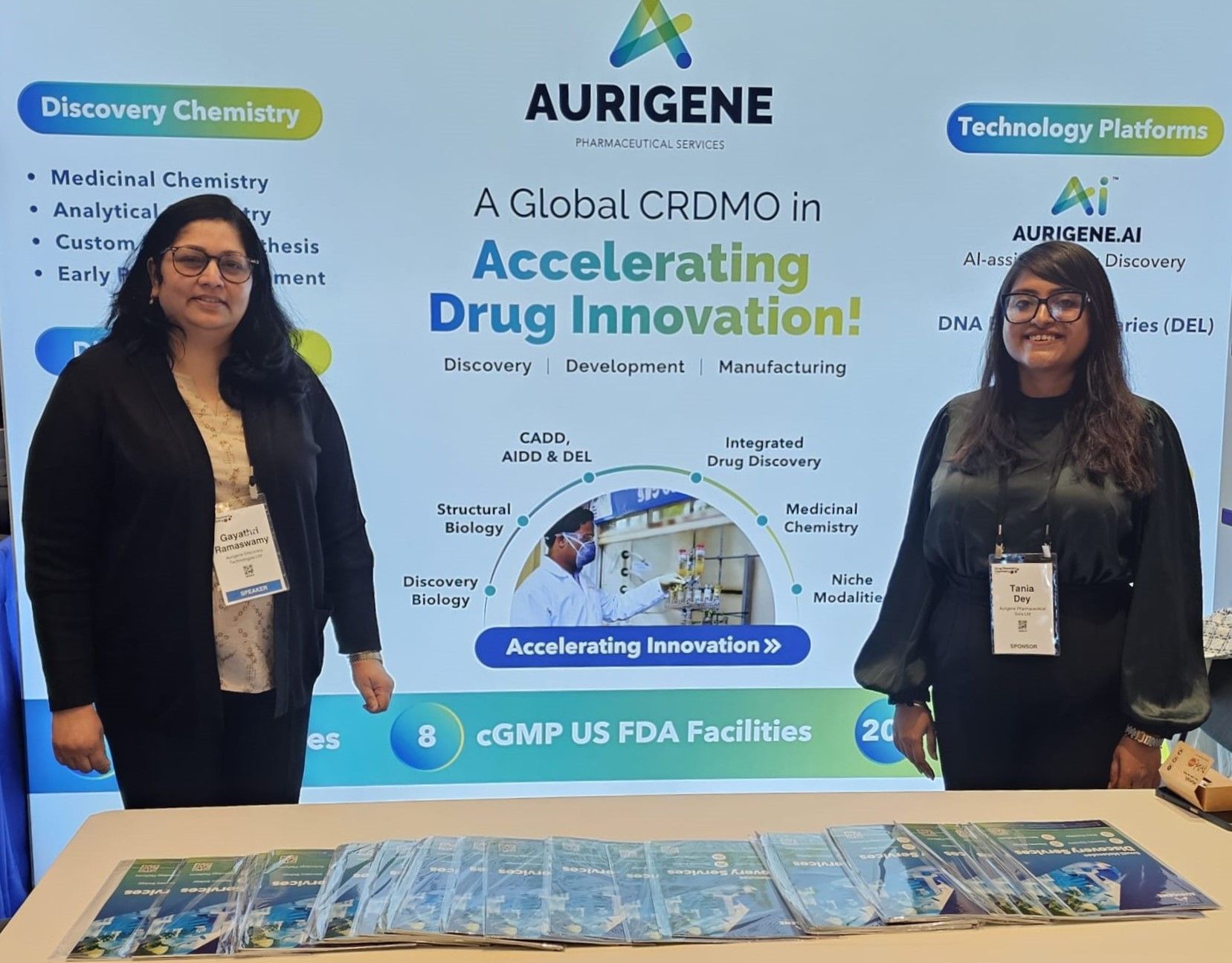Aurigene’s Dr. Gayathri Ramaswamy Showcased Exciting Data Demonstrating Rapid Design and Synthesis of RIPK2 Degraders at the Drug Discovery Chemistry Conference 2025
Dr. Gayathri Ramaswamy presents Aurigene’s RIPK2 degraders at DDC 2025, showcasing targeted drug discovery via partial PROTAC library.
Breaking News
May 22, 2025
Simantini Singh Deo

Aurigene Pharmaceutical Services Limited’s Global Head of Discovery Services, Dr. Gayathri Ramaswamy, Ph.D., delivered a presentation at the Discovery & Development Conference (DDC) 2025, held at the Hilton Bayfront, San Diego, on April 17, 2025. Her talk, titled “Design and Rapid Synthesis of RIPK2 Degraders Using an In-House Partial PROTAC Library,” spotlighted Aurigene’s innovative approach to developing targeted protein degraders and its applications for drug discovery.
Advancing PROTAC Science for Next-Generation Therapeutics
PROteolysis TArgeting Chimeras (PROTACs) are heterobifunctional molecules that exploit the body’s natural disposal mechanism to selectively degrade proteins of interest (POI). By recruiting the target protein to the Ubiquitin Proteasome System (UPS), PROTACs facilitate its degradation, offering a promising therapeutic approach for diseases such as cancer, autoimmune disorders, and neurodegenerative conditions.
At DDC 2025, a premier event uniting North American biopharma decision-makers and innovators, Dr. Ramaswamy shared insights into the design and rapid synthesis of novel RIPK2 degraders leveraging Aurigene’s proprietary partial PROTAC library. Her presentation highlighted the potential of these molecules to accelerate drug discovery by enabling targeted protein degradation with enhanced specificity and efficiency.
RIPK2 (Receptor-interacting serine/threonine protein kinase 2) is a critical immunomodulator implicated in NOD1, NOD2, and TLR signaling pathways, with elevated expression linked to certain tumors. Targeting RIPK2 for degradation using PROTACs offers a compelling therapeutic rationale for novel immunotherapies.
Speaking of Aurigene’s PROTACs library, Dr. Gayathri mentioned, “Our PROTAC discovery engine combines deep biological insights with iterative design and a proprietary partial library — enabling rapid optimization of degraders with superior pharmacokinetic and degradation profiles.”
Key highlights of the presentation included:
A central discovery toolbox featuring custom bio-reagents, tool compounds, and high-throughput screening systems, adaptable for both small and large molecule modalities.
Aurigene’s comprehensive PROTAC discovery approach, driven by a deep understanding of biological targets (e.g., protein half-life, isoform compensation, E3 ligase expression), a suite of in vitro binding/functional assays (FP, SPR, ITC, CETSA, HTRF, NanoBRET, TR-FRET), and extensive DMPK profiling capabilities.
Over a decade of experience utilizing a proprietary partial PROTAC library, enabling rapid analoguing and synthesis of novel degraders.
Rational design strategies incorporating CADD-based ligand identification, linker optimization, and exploration of diverse E3 ligases (CRBN, VHL, MDM-2, cIAP), with capabilities extending to AUTACs, ATTECs, and Oligo-PROTACs.
The session also featured a detailed case study on RIPK2 degradation, showcasing a systematic approach to developing a PROTAC-based degrader with enhanced efficacy and pharmacokinetics:
Functional assays demonstrated effective RIPK2 inhibition and degradation, surpassing traditional kinase inhibitors.
Iterative medicinal chemistry optimization led to NB1-033-P, a novel compound with improved PK, reduced clearance, and favorable in vivo bioavailability.
Proprietary deep neural network models were used to predict degradation potential, supporting a highly targeted and efficient discovery process.
Looking Ahead: AI-Powered Discovery (Aurigene.ai)
Summarizing the impact, Dr. Gayathri noted, “Our in-house partial PROTAC library, coupled with computational design and integrated profiling, enables us to rapidly generate and optimize novel degraders like NB1-033-P. These advances have the potential to accelerate identification and development of specific targeted protein degraders for multiple disease indications.”
Aurigene’s next steps include leveraging the Aurigene.ai platform to design new RIPK2 degraders and inhibitors & synthesize using in-house partial PROTAC library, with a focus on rapid profiling and IP generation, followed by In-vitro, In-vivo and ADME/PK of synthesized degraders.
About Drug Discovery Chemistry 2025
DDC 2025 is a leading biopharma conference featuring over 50 technical presentations and case studies on Targeted Protein Degradation, Integrated Drug Discovery, AI-guided chemistry, molecular degraders, and more. The event serves as a hub for pharmaceutical and biotech innovators committed to accelerating early-stage R&D and advancing next-generation therapeutics.
About Aurigene Pharmaceutical Services Limited
Aurigene Pharmaceutical Services Limited is a leading Contract Research, Development, and Manufacturing Organization (CRDMO) specializing in innovative small molecule drug discovery. The company offers end-to-end discovery services, including medicinal chemistry, in vitro and in vivo biology, and integrated platforms spanning from target identification to IND filing. With advanced capabilities in Computer-Aided Drug Design (CADD) and bioinformatics, Aurigene accelerates data-driven drug development. The organization also focuses on cutting-edge technological platforms such as Targeted Protein Degraders (TPDs), Peptides, Oligonucleotides, Steroids, and mPEGs, enabling the discovery of next-generation therapeutics.
